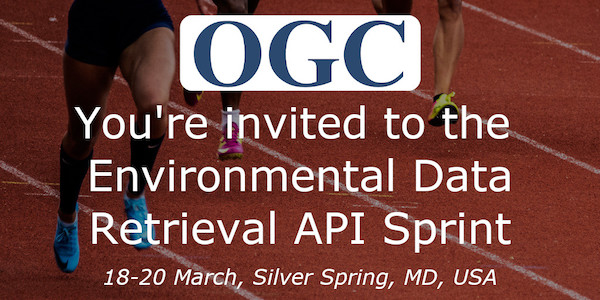New OGC Sprint event will focus on emerging standards for a data-centric Environmental Data Retrieval API that will promote quick and easy access to environmental data.

The Open Geospatial Consortium (OGC) invites developers to participate in the Environmental Data Retrieval (EDR) API Sprint, held from 18-20 March, 2020, at the NOAA/NWS facilities in Silver Spring, MD, USA. Remote participation is possible.
The EDR API Sprint is a follow-up to the successful MetOcean Weather and Oceans APIs Hack, and will focus on emerging standards for a data-centric Environmental Data Retrieval API. This event is organized jointly with the EDR API Standards Working Group (SWG) and the Meteorology and Oceanography (MetOcean) Domain Working Group (DWG) to advance work of mutual interest to both groups.
OGC has been developing a new generation of web API standards leveraging the OpenAPI specification to document requirements for implementation. Initial API efforts focused on API – Features, and more recently on Coverages, arrays and gridded data. There is also growing interest from users and the community for APIs based on simple data retrieval patterns.
The EDR API SWG and MetOcean DWG have been developing a set of stable data APIs, defined with OpenAPI, to retrieve common data patterns from a relatively persistent data store. These APIs will, in a self-describing way, promote quick and easy access to environmental data. The currently supported data patterns include data at a point in space and time, time series at a point, and 2D/3D polygons. See the EDR API Candidate Specification for more info.
The purpose of this Sprint is to:
- Attempt to build implementations of the data API service based on existing data, and provide feedback based on the current specifications;
- develop client-side value-added applications that consume data from UK Met Office and NWS API prototype implementations; and
- rapid prototyping of other geometry types for the EDR API (grids, profiles and/or trajectories/corridor).
The objectives of this Sprint are to verify and validate requirements and methods for the query and filter operations of the EDR API, develop prototype functionality through running code, and assess the compatibility of the capabilities with the OGC API – Features standard and the in-progress OGC API – Common standard.
An OGC Sprint is a collaborative event driven by rapid code development to implement and test specific capabilities of a technical approach or standard. An example is advancing and testing specific parts of a draft OGC standard. Recent OGC Sprints have advanced the development of OGC API specifications – including OGC APIs for Features, Catalogues, Coverages, and more – by providing the opportunity and environment for the geospatial community to collaborate.
For more information on the Sprint, including details concerning registration and attendance, visit the Environmental Data Retrieval (EDR) API Sprint page on the OGC website.
For more information on the new OGC API suite of standards visit ogcapi.org.
About OGC
The Open Geospatial Consortium (OGC) is an international consortium of more than 530 businesses, government agencies, research organizations, and universities driven to make geospatial (location) information and services FAIR – Findable, Accessible, Interoperable, and Reusable.
OGC's member-driven consensus process creates royalty free, publicly available geospatial standards. Existing at the cutting edge, OGC actively analyzes and anticipates emerging tech trends, and runs an agile, collaborative Research and Development (R&D) lab that builds and tests innovative prototype solutions to members' use cases.
OGC members together form a global forum of experts and communities that use location to connect people with technology and improve decision-making at all levels. OGC is committed to creating a sustainable future for us, our children, and future generations.
Visit ogc.org for more info on our work.
“







